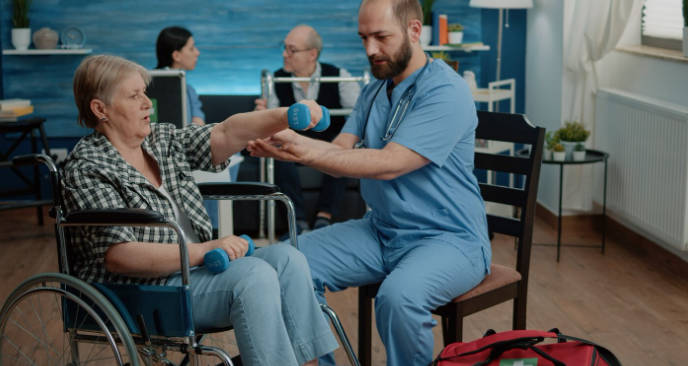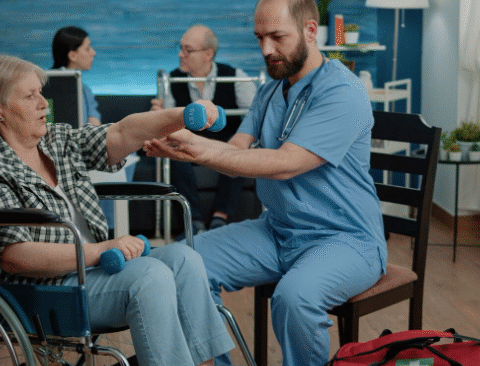When a parent or loved one begins to need more day-to-day support, the choices can feel overwhelming. You’ll hear terms like “home care” and “home health” used interchangeably, but they aren’t the same thing—and the differences matter when you’re deciding who to bring into your home. One service is focused on comfort and routine, while the other is rooted in medical necessity. Choosing the right option begins with understanding what each one actually provides.
Both home care and home health are valuable—but they serve different roles in a person’s life. The best decision depends on what kind of support your loved one truly needs. And often, families don’t need to choose just one. These services can complement each other when thoughtfully coordinated.
Home Care Is Personal Support That Keeps Daily Life on Track
Home care is non-medical assistance designed to help seniors maintain dignity, comfort, and independence at home. It includes help with everyday activities like bathing, dressing, grooming, meals, light housekeeping, and companionship. The goal is not to treat a condition but to support a lifestyle. Home care works well for older adults who want to stay in their homes but need help navigating each day safely.
These caregivers are not nurses, but they are trained professionals who know how to assist respectfully and reliably. Many families build long-term relationships with home care aides who become trusted figures in their loved one’s life. That consistency can be a stabilizing force—especially when memory issues are involved. It’s about making home feel like home, even as needs evolve.
Home Health Is Clinical Care Delivered at Home
Home health, by contrast, is medical in nature. These services are ordered by a doctor and delivered by licensed professionals such as nurses, physical therapists, or occupational therapists. They’re often temporary and goal-oriented—helping patients recover from surgery, manage chronic illness, or avoid hospitalization. Most home health care is covered by Medicare or insurance if the patient qualifies.
For example, if your mother recently had a fall and needs wound care or mobility training, a home health nurse or therapist may visit multiple times a week. Once she’s stable, that service may stop. At that point, a non-medical caregiver can step in to continue helping with bathing, meals, or errands. The distinction lies in why they’re there: one for treatment, the other for daily living.
How to Know Which One You Need (Or Both)
If your loved one is recovering from a health event or managing a diagnosis, talk to their physician about eligibility for home health. But if the concern is more about loneliness, fall risk, skipped meals, or forgotten medications, home care is likely the right place to start. Families often begin with one and layer in the other as needs shift. It doesn’t have to be all or nothing.
You don’t need to figure this out alone. Many care providers can assess your loved one’s condition and recommend the right blend of services. And some agencies provide both under one roof, making the coordination smoother. If you’re feeling uncertain, you’re not the only one—most families are learning as they go.
What Home Care Typically Includes
When you hear “home care,” think daily rhythm—not prescriptions or procedures. These are the hands-on helpers who fill the gaps that family members can’t always cover.
Here’s a snapshot of what’s commonly offered:
- Personal care (bathing, grooming, dressing)
- Meal preparation and light housekeeping
- Medication reminders (not administration)
- Companionship and emotional support
- Transportation to appointments or errands
- Fall prevention and mobility assistance
These services can be part-time or around-the-clock, depending on what the family needs.
What Home Health Typically Covers
Home health, since it’s clinical, focuses more on restoring or managing health conditions. It’s prescribed by a doctor and requires medical documentation.
You might receive:
- Skilled nursing for injections, vitals, and wound care
- Physical therapy for mobility and strength
- Occupational therapy for tasks like dressing and eating
- Speech therapy for communication or swallowing issues
- Chronic disease management for conditions like COPD or diabetes
These visits are structured and time-limited, often ending when treatment goals are met.
The Overlap: When Home Care and Home Health Work Together
Many seniors benefit from a hybrid approach—clinical support for a medical issue and personal care for the rest of the day. For example, a home health nurse might stop by in the morning to check vitals, while a home care aide helps with laundry and breakfast afterward. That kind of layered support provides both structure and comfort. It’s not about choosing one over the other but building a care ecosystem that fits the family.
In fact, more families are discovering that services like home care services in Chicago, Illinois at Ace Home Care offer flexible plans that evolve alongside changing health needs. That continuity matters when trust is involved. Whether you start with home care or transition from home health, having both options under one roof can make care transitions feel less jarring.
When Insurance Gets Involved
Insurance tends to cover home health, not home care. That can be frustrating for families, especially when what’s needed isn’t clinical, but still essential. Home care is typically paid out of pocket or through long-term care insurance. That cost can vary depending on location, schedule, and level of care required.
Still, for many families, the peace of mind and stability is worth it. Planning ahead and understanding the financial side of care can make a huge difference down the road. Some agencies offer free consultations to walk families through their options. Don’t wait for a crisis to get clarity.
How to Have the Conversation With Your Parent
Talking about care is never easy. Most seniors don’t want to feel like they’re being “put into” anything. The key is to frame support as something that protects their lifestyle, not limits it. Home care, especially, can be introduced as a way to maintain independence, not take it away.
Start with what matters most to them—safety, privacy, routine—and show how support can make those things easier to keep. Use phrases like “This is for your comfort” rather than “You can’t do this anymore.” Respect leads to more open conversations. And often, trying care for just a few hours a week can open the door to more help later on.
Ready to find support that meets your parent where they are—without rushing the process? Ace Home Care Inc. offers flexible, top-rated home care services in Chicago that preserve dignity and reduce the load on family caregivers. Let’s talk about what support really looks like.







